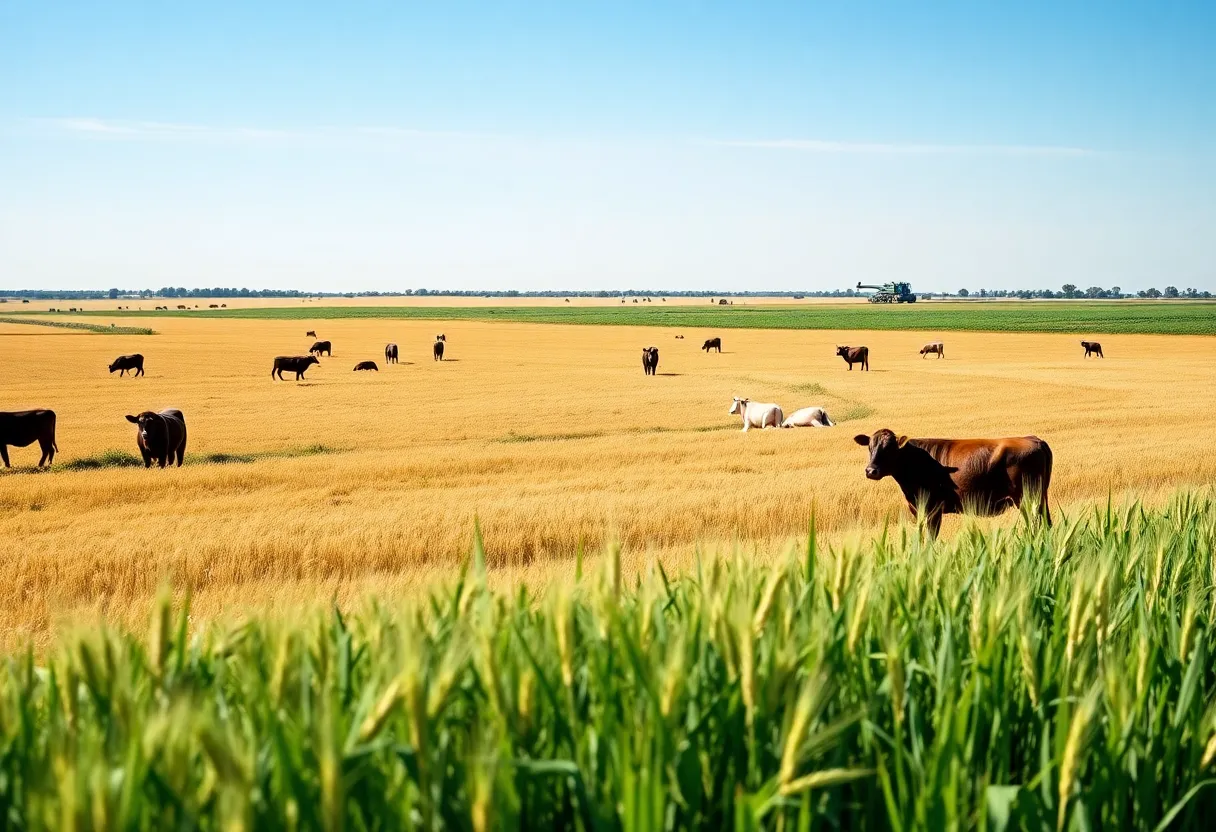Enid, October 6, 2025
The Oklahoma Farmers’ Cooperative has announced a $3 million investment in precision farming tools aimed at wheat and cattle producers in Enid. This initiative seeks to minimize water usage by 20%, addressing ongoing drought concerns. Local farmers are optimistic about the potential improvements in crop yields and support for rural businesses across Oklahoma. The project incorporates advanced technologies to optimize farming practices and enhance productivity, promoting sustainability in the agriculture sector.
Enid
The Oklahoma Farmers’ Cooperative has unveiled a new sustainable agriculture initiative in Enid, investing $3 million in precision farming tools for wheat and cattle producers. This program targets a significant environmental challenge by aiming to reduce water usage by 20 percent, addressing ongoing drought concerns across the region. Local farmers have expressed support for the effort, noting its potential to improve crop yields and bolster rural businesses throughout the state.
Details of the Initiative
Precision farming tools play a central role in this initiative, incorporating advanced technologies such as GPS-guided equipment, soil sensors, and data analytics to optimize resource allocation. For wheat producers, these tools enable precise planting and irrigation schedules, minimizing waste while maximizing productivity. Cattle producers benefit from similar innovations, including automated monitoring systems that track water needs for livestock and pasture management. The $3 million investment covers the distribution of these tools to eligible participants, focusing on operations in Enid and surrounding areas.
The program’s emphasis on water conservation responds directly to prolonged drought conditions that have strained agricultural resources in Oklahoma. By integrating real-time data collection, farmers can adjust practices based on actual environmental conditions, rather than relying on broad estimates. This approach not only conserves water but also reduces the overall environmental impact of farming activities, promoting long-term sustainability.
Impact on Local Producers
Wheat and cattle production form the backbone of Oklahoma’s agricultural economy, and this initiative directly supports these sectors. Producers in Enid, a key hub for grain handling and livestock operations, stand to gain the most immediate benefits. The precision tools are designed to enhance yields without increasing input costs, helping farms remain competitive amid fluctuating market prices and climate uncertainties.
Support from local ranchers and farmers highlights the initiative’s relevance. They view it as a practical step toward resilience, enabling better adaptation to water scarcity while sustaining economic viability. The program’s reach extends statewide, offering resources that could influence rural businesses beyond Enid by fostering more efficient operations and potentially increasing output for regional markets.
Broader Context and Background
Oklahoma’s agricultural landscape has faced increasing pressure from climate variability, with droughts affecting crop cycles and livestock health for several years. The Oklahoma Farmers’ Cooperative, as a longstanding organization dedicated to farmer support, has prioritized initiatives that align with these challenges. This $3 million investment builds on previous efforts to modernize farming practices, drawing from successful models in precision agriculture adopted elsewhere in the Midwest.
The initiative’s focus on wheat and cattle reflects their economic importance in the state. Wheat is a staple crop, contributing significantly to Oklahoma’s grain exports, while cattle ranching supports a vast network of related industries, from feed suppliers to meat processing. By targeting a 20 percent reduction in water usage, the program addresses a critical pain point, as water resources have dwindled due to inconsistent rainfall and higher evaporation rates.
Implementation involves partnerships with agricultural extension services to train producers on tool usage, ensuring widespread adoption. Early participants in Enid have begun integrating the technologies, with initial feedback indicating improved efficiency in water management. As the program expands, it could set a precedent for similar efforts, encouraging other cooperatives to invest in sustainable solutions.
Economically, the initiative supports rural communities by helping maintain agricultural productivity, which employs a substantial portion of the workforce in areas like Enid. Enhanced yields from precision farming could lead to greater revenue for producers, stabilizing local economies and contributing to the state’s overall agricultural output. This development arrives at a time when sustainable practices are gaining traction nationwide, driven by consumer demand for environmentally responsible products.
In summary, the sustainable agriculture initiative represents a targeted response to drought challenges, equipping wheat and cattle producers with tools for better resource management. Its $3 million commitment underscores a proactive approach to balancing productivity with environmental stewardship, benefiting Enid’s farming community and extending support across Oklahoma.
FAQ
- What is the new sustainable agriculture initiative in Enid?
- The Oklahoma Farmers’ Cooperative has unveiled a new sustainable agriculture initiative in Enid, investing $3 million in precision farming tools for wheat and cattle producers.
- What is the main goal of the program regarding water usage?
- The program aims to reduce water usage by 20% amid ongoing drought concerns.
- Who are the primary beneficiaries of the initiative?
- The initiative is designed for wheat and cattle producers, with local support noted for enhancing yields and supporting rural businesses statewide.
- How will the precision farming tools help producers?
- Precision farming tools incorporate advanced technologies to optimize resource allocation, minimize waste, and improve productivity for wheat and cattle operations.
- What challenges does the initiative address?
- It responds to ongoing drought concerns by promoting water conservation and sustainable practices in Oklahoma’s agriculture.
Key Features Chart
| Feature | Description | Benefits |
|---|---|---|
| Investment Amount | $3 million dedicated to precision farming tools | Supports adoption of advanced technology for wheat and cattle producers |
| Water Reduction Goal | Aims to reduce water usage by 20% | Addresses ongoing drought concerns and conserves resources |
| Target Sectors | Wheat and cattle production | Enhances yields and supports rural businesses statewide |
| Technology Components | GPS-guided equipment, soil sensors, data analytics | Optimizes resource allocation and minimizes waste |
| Geographic Focus | Initiated in Enid, Oklahoma | Provides immediate benefits to local producers with statewide impact |


